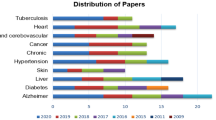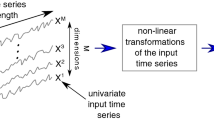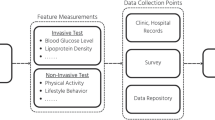Abstract
In general, numerous inbuilt diagnosis complications are due to improper or missing data. Thus, it becomes mandatory to perform proper imputation of the missed values to predict the diseases accurately. Imputation operations will be crucial when we encounter incompletely recorded patient data. The measurement of blood glucose level is considered to be the most important health-conscious effort that one does periodically since the false diagnosis of it leads to misinterpretation of patient health conditions that might cause fatal outcomes. But predicting those measures has become a tedious task in the course of diabetic treatment of these days. This paper focuses on the aim of the imputation of the missing patient-specific diabetic data, especially to overcome the existing methods’ demerits of yielding lesser accuracy and more time. This work attempts to predict the blood glucose levels by analyzing time-series data along with the patient activities. The patient activities are being thoroughly investigated here in this work; for instance, with the first 20-day diabetic data of a patient, the diabetic forecast for the next 10 days is made in the considered month. This prediction of patient diabetic conditions is done by proposing a novel approach for predicting the blood glucose levels with the aid of Maclaurin series-based expectation maximization, estimation of correlation relationship and dissimilarities, kernel-based Hilbert–Schmidt optimization, optimized features, and classification using the deep learning methodology of RNN—recurrent neural network. Finally, we make the performance analysis with the performance metrics like accuracy, Kappa, TN, TP, FN, FP, precision, recall, Jaccard coefficient, F1-measure, and error.





Similar content being viewed by others
References
Abbasi-Sureshjani S, Dashtbozorg B, ter Haar Romeny BM, Fleuret F (2017) Exploratory study on direct prediction of diabetes using deep residual networks. In: European Congress on computational methods in applied sciences and engineering, pp 797–802
Aliberti A, Pupillo I, Terna S, Macii E, Di Cataldo S, Patti E, Acquaviva A (2019) A multi-patient data-driven approach to blood glucose prediction. IEEE Access 7:69311–69325
Allam F, Nossai Z, Gomma H, Ibrahim I, Abdelsalam M (2011) A recurrent neural network approach for predicting glucose concentration in type-1 diabetic patients. In: Engineering applications of neural networks. Springer, Berlin, pp 254–259
Allen TT, Sui Z, Parker NL (2017) Timely decision analysis enabled by efficient social media modeling. Decis Anal 14:250–260
Allen TT, Sui Z, Akbari K (2018) Exploratory text data analysis for quality hypothesis generation. Qual Eng 30:701–712
Ashiquzzaman A, Tushar AK, Islam MR, Shon D, Im K, Park J-H et al (2018) Reduction of overfitting in diabetes prediction using deep learning neural network. In: Kim KJ, Kim H, Baek N (eds) IT convergence and security 2017. Springer, Berlin, pp 35–43
Chandrakar O, Saini JR (2014) Comparative analysis of prediction accuracy of general and personalized datasets based classification model for medical domain. Heart Dis 1:25–28
D. T. V. Dataset. https://archive.ics.uci.edu/ml/datasets/diabetes. Accessed 13 Sept 2019
Dankwa-Mullan I, Rivo M, Sepulveda M, Park Y, Snowdon J, Rhee K (2019) Transforming diabetes care through artificial intelligence: the future is here. Popul Health Manag 22:229–242
Dempster AP, Laird NM, Rubin DB (1977) Maximum likelihood from incomplete data via the EM algorithm. J R Stat Soc Ser B (Methodol) 39:1–22
Fong S, Mohammed S, Fiaidhi J, Kwoh CK (2013) Using causality modeling and Fuzzy Lattice Reasoning algorithm for predicting blood glucose. Expert Syst Appl 40:7354–7366
Fox I, Ang L, Jaiswal M, Pop-Busui R, Wiens J (2018) Deep multi-output forecasting: learning to accurately predict blood glucose trajectories. In: Proceedings of the 24th ACM SIGKDD international conference on knowledge discovery & data mining, pp 1387–1395
Gadaleta M, Facchinetti A, Grisan E, Rossi M (2018) Prediction of adverse glycemic events from continuous glucose monitoring signal. IEEE J Biomed Health Inf 23:650–659
Gu W, Zhou Z, Zhou Y, He M, Zou H, Zhang L (2017) Predicting blood glucose dynamics with multi-time-series deep learning. In: Proceedings of the 15th ACM conference on embedded network sensor systems, p 55
Hamdi T, Ali JB, Di Costanzo V, Fnaiech F, Moreau E, Ginoux J-M (2018) Accurate prediction of continuous blood glucose based on support vector regression and differential evolution algorithm. Biocybern Biomed Eng 38:362–372
Kaur H, Kumari V (2018) Predictive modelling and analytics for diabetes using a machine learning approach. Appl Comput Inf. https://doi.org/10.1016/j.aci.2018.12.004
Li K, Daniels J, Liu C, Herrero-Vinas P, Georgiou P (2019a) Convolutional recurrent neural networks for glucose prediction. IEEE J Biomed Health Inf. https://doi.org/10.1109/JBHI.2019.2908488
Li K, Liu C, Zhu T, Herrero P, Georgiou P (2019b) GluNet: a deep learning framework for accurate glucose forecasting. IEEE J Biomed Health Inf. https://doi.org/10.1109/JBHI.2019.2931842
Mhaskar HN, Pereverzyev SV, van der Walt MD (2017) A deep learning approach to diabetic blood glucose prediction. Front Appl Math Stat 3:14
Naumova V, Nita L, Poulsen JU, Pereverzyev SV (2016) Meta-learning based blood glucose predictor for diabetic smartphone app. In: Kirchsteiger H, Jørgensen JB, Renard E, del Re L (eds) Prediction methods for blood glucose concentration. Springer, Berlin, pp 93–105
Oviedo S, Vehí J, Calm R, Armengol J (2017) A review of personalized blood glucose prediction strategies for T1DM patients. Int J Numer Methods Biomed Eng 33:e2833
Plis K, Bunescu R, Marling C, Shubrook J, Schwartz F (2014) A machine learning approach to predicting blood glucose levels for diabetes management. In: Workshops at the Twenty-Eighth AAAI conference on artificial intelligence
Pustozerov E, Yuldashev Z, Popova P, Bolotko YA, Tkachuk A (2018) Information support system for patients with gestational diabetes mellitus. Biomed Eng 51:407–410
Rajagopal RD, Murugan S, Kottursamy K, Raju V (2019) Cluster based effective prediction approach for improving the curable rate of lymphatic filariasis affected patients. Clust Comput 22(1):197–205
Sui Z (2017) Hierarchical text topic modeling with applications in social media-enabled cyber maintenance decision analysis and quality hypothesis generation. The Ohio State University, Columbus
Sui Z (2019) Social media text data visualization modeling: a timely topic score technique. Am J Manag Sci Eng 4:49–55
Sun Y (2019) Analysis for center deviation of circular target under perspective projection. Eng Comput. https://doi.org/10.1108/EC-09-2018-0431
Wu C, Miller J, Chang Y, Sznaier M, Dy J (2019) Spectral non-convex optimization for dimension reduction with Hilbert–Schmidt independence criterion. arXiv preprint arXiv: 1909.05097
Young HA, Gaylor CM, de Kerckhove D, Watkins H, Benton D (2019) Interoceptive accuracy moderates the response to a glucose load: a test of the predictive coding framework. Proc R Soc B 286:20190244
Zhu T, Li K, Herrero P, Chen J, Georgiou P (2018) A deep learning algorithm for personalized blood glucose prediction. In: KHD@ IJCAI, pp 64–78
Author information
Authors and Affiliations
Corresponding author
Ethics declarations
Conflict of interest
The authors declare that they have no conflict of interest.
Ethical approval
This article does not contain any studies with human participants or animals performed by any of the authors.
Informed consent
Informed consent was obtained from all individual participants included in the study.
Additional information
Communicated by V. Loia.
Publisher's Note
Springer Nature remains neutral with regard to jurisdictional claims in published maps and institutional affiliations.
Rights and permissions
About this article
Cite this article
Sangeetha, M., Senthil Kumaran, M. Deep learning-based data imputation on time-variant data using recurrent neural network. Soft Comput 24, 13369–13380 (2020). https://doi.org/10.1007/s00500-020-04755-5
Published:
Issue Date:
DOI: https://doi.org/10.1007/s00500-020-04755-5




